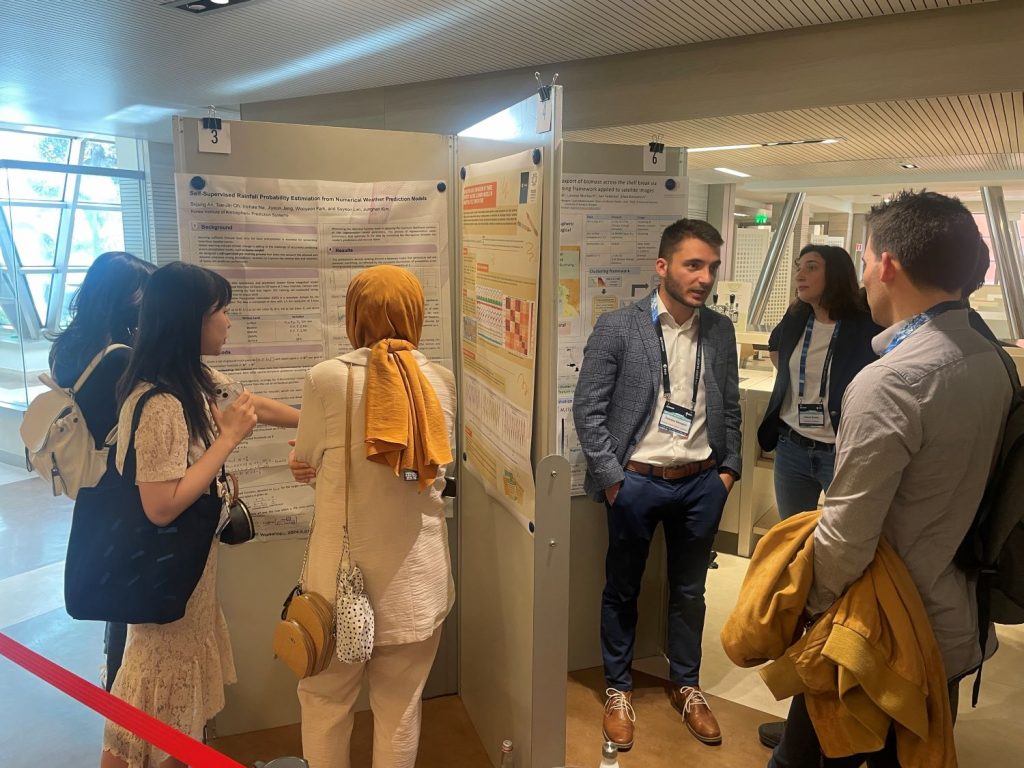Φ-lab gives major impetus to ESA-ECMWF ML4ESOP workshop



With record attendance and a host of new topics covered, the 2024 joint workshop on Machine Learning for Earth System Observation and Prediction (ML4ESOP) has just drawn to a close. Organised by ESA Φ-lab and ECMWF, the workshop explores synergies between machine learning, deep learning and conventional tools as applied to satellite observations and weather and climate models.
Machine learning and deep learning (ML/DL) are already proven technologies for enhancing our understanding of the planet’s complex dynamics, leveraging new methodologies and high-performance computing to process and analyse enormous datasets automatically. The intersection between Earth observation (EO), Earth System Prediction and AI is a point where a number of disciplines can come together and experts from each field can synergistically advance the state of the art.
This forms the guiding principle of the ESA-ECMWF ML4ESOP workshop, which each year gathers a diverse community of practitioners to look at the progress and challenges in the fusion of traditional ESOP techniques with ML/DL. This year’s event was held from 7 to 10 May and boasted almost 800 registrations online and in person, comprising academia, public institutions and industry.
Apart from hosting the 2024 workshop at ESA’s ESRIN establishment, Φ-lab played a fundamental role through its participation in the organising and scientific committees, the chairing of sessions, the presentation of a number of research initiatives and the lively discussions throughout the four days.
ECMWF’s Massimo Bonavita, who organised the event with Φ-lab AI Applications Lead Rochelle Schneider, was impressed by the turnout: “Each year we see a higher number of participants and an ever-broader range of research subject areas. The new and exciting thematic areas that were selected as the framework of the workshop ensured that the key elements and hurdles of ML4ESOP were addressed, with engaging contributions on weather and climate from a truly international cohort of researchers.”
Indeed, this year’s thematic areas (TAs) gave an enticing structure to the proceedings. TA1 was a new addition and covered Destination Earth (DestinE), reflecting the importance of the initiative’s platform, digital twin and data lake components. ESA and ECMWF are both development partners of DestinE, as is EUMETSAT, another contributor at the workshop.
TA2, entitled Multidomain ML4ESOP, delved into the integration of natural language processing and DL techniques into satellite image analysis. TA3 and TA4 both looked into weather and climate prediction, the former with respect to end-to-end ML and the latter in terms of hybrid approaches that combine ML with physics-based methodologies. Last but certainly not least, TA5 dealt with the emerging enablers of powerful ML4ESOP: high-performance, edge and quantum computing.
A wide range of applications were presented in the sessions, including volcanic cloud tracking, sea-ice detection, permafrost carbon dynamics, precipitation nowcasting, tree height estimation and European summer drought prediction to name but a few. Φ-labbers gave talks on the ESA-UNICEF child connectivity project and vision-based solar forecasting models.
Two poster sessions were distributed across the four days. Over 70 posters were on display, giving representatives from both the private and public sectors the opportunity to showcase ML4ESOP research that in many cases focused on extreme weather modelling and prediction.

One of the guests at the gathering was Stephan Hoyer, Applied Sciences Research Lead at Google, who was also treated to a visit to Φ-lab: “This workshop has given us great exposure to other perspectives on EO, weather forecasting and AI, including some fascinating conversations with delegates from a huge variety of backgrounds.”
Each TA had an accompanying working group to discuss the topics presented, and the final afternoon featured a plenary session that brought the event to a conclusion. “The plenary underlined just how much had been covered during the workshop, together with the strategies we need to adopt as a community to propel ML4ESOP forward,” Rochelle commented. “It’s clear that machine learning is an indispensable tool in our quest to understand and predict the behaviour of Earth systems, and I’m confident that the work discussed will help determine the optimum approaches for future research in this domain.”
The workshop content is available on the event website.
To know more: Φ-lab, ECMWF, EUMETSAT
Photos courtesy of ESA and ECMWF/Mike Morrissey
Share